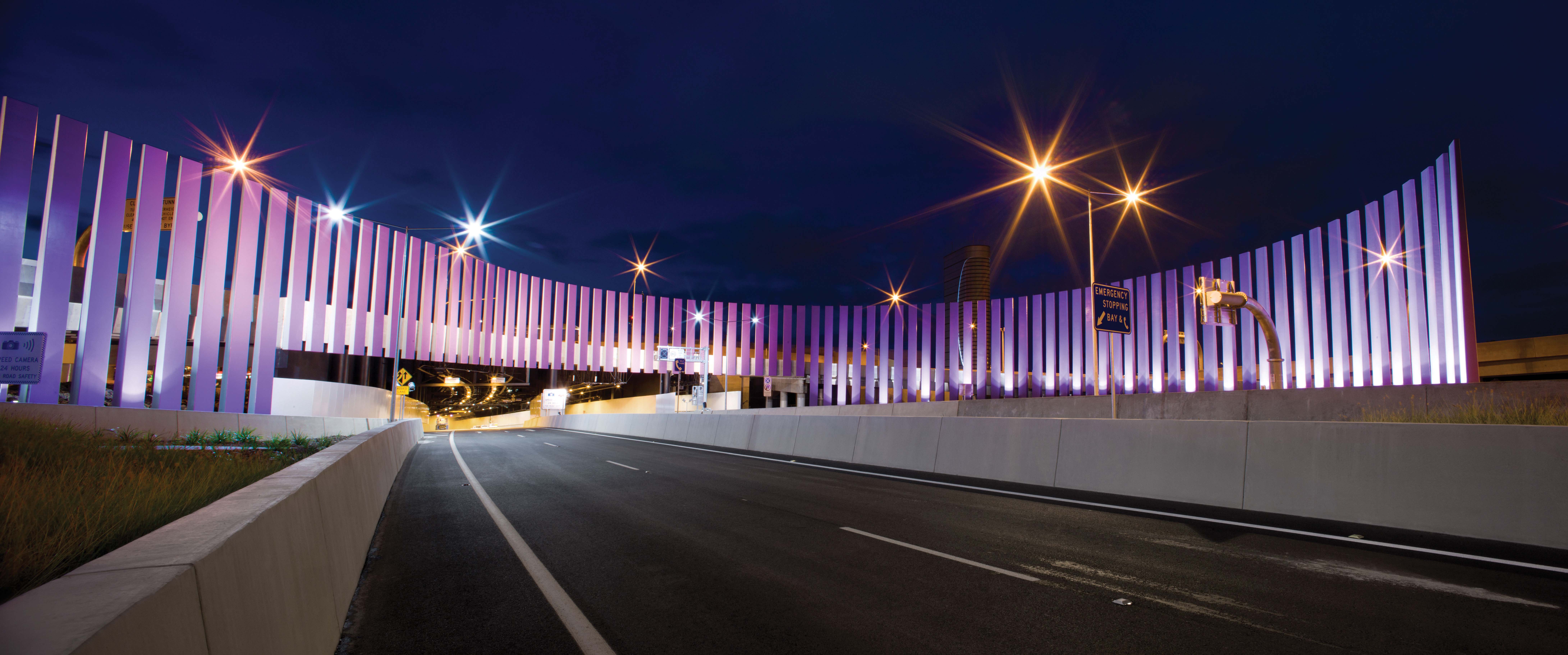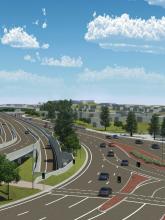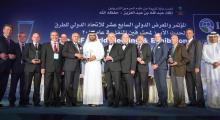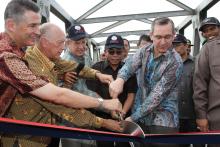The revolutionary AUD$4.8 billion Airport Link has delivered a landmark infrastructure project for Australia, tackling traffic congestion, enhancing the busway network and removing an infamous traffic bottleneck through an innovative and inspired design. The Airport Link in Brisbane, Australia included three separate projects – the Northern Busway (a 3km two-way dedicated busway), the Airport Roundabout Upgrade and the AirportlinkM7 (a 6.7km toll road including 5.2km of tunnel). Together, they represent the

Parsons Brinckerhoff and Arup joint venture won the 2013 GRAA for Design
RSSThe revolutionary AUD$4.8 billion Airport Link has delivered a landmark infrastructure project for Australia, tackling traffic congestion, enhancing the busway network and removing an infamous traffic bottleneck through an innovative and inspired design.
The Airport Link in Brisbane, Australia included three separate projects – the Northern Busway (a 3km two-way dedicated busway), the Airport Roundabout Upgrade and the AirportlinkM7 (a 6.7km toll road including 5.2km of tunnel). Together, they represent the largest single investment in transport infrastructure ever undertaken in Australia. The project was delivered by the2642 Thiess 4755 John Holland (TJH) joint venture with 2693 Parsons Brinckerhoff and 1419 Arup joint venture as the lead design partner, for the Queensland Government-appointed 2641 BrisConnections.
Parsons Brinckerhoff and Arup joined forces – as PBA – to provide technical input into the tender and to deliver the detailed design and construction phase services support. PBA engaged more than 1,000 staff, who worked more than one million hours from start-up in 2006 through to completion in July 2012. During that time PBA delivered more than 18,000 ‘for construction’ drawings in 600 packages with a Total of 3,600 submission cycles.
Aside from 15km of tunnel, the scheme boasts 25 bridges, 15 cut and cover structures, 8.5km of roadway, bicycle paths, 3.5ha of new parklands, more than one million new plants, three ventilation stations, and an operations control building.
The scale and complexity of the project, along with very tight constraints imposed by a highly-populated environment and the need to keep roads open, presented a formidable design challenge. These challenges required a range of technical innovations including underground road interchanges in caverns, the largest of which was 28m wide, and an innovative multilevel flyover with a fast-diamond interchange.
PBA’s scope of works included tunnel, road, geotechnical, electrical and mechanical, fire and life safety, structural and civil works design, as well as coordinating the urban design via subcontracted resources.
2014 GRAA Applications
The Global Road Achievement Awards (GRAA) is a one-of-a-kind competition to recognise innovative road projects and exemplary people that place the road industry at the forefront of worldwide social and economic development.
ENTRIES SHOULD BE SUBMITTED BY JUNE 30, 2014. More information at: www.irfnews.org/graa
The Airport Link in Brisbane, Australia included three separate projects – the Northern Busway (a 3km two-way dedicated busway), the Airport Roundabout Upgrade and the AirportlinkM7 (a 6.7km toll road including 5.2km of tunnel). Together, they represent the largest single investment in transport infrastructure ever undertaken in Australia. The project was delivered by the
Parsons Brinckerhoff and Arup joined forces – as PBA – to provide technical input into the tender and to deliver the detailed design and construction phase services support. PBA engaged more than 1,000 staff, who worked more than one million hours from start-up in 2006 through to completion in July 2012. During that time PBA delivered more than 18,000 ‘for construction’ drawings in 600 packages with a Total of 3,600 submission cycles.
Aside from 15km of tunnel, the scheme boasts 25 bridges, 15 cut and cover structures, 8.5km of roadway, bicycle paths, 3.5ha of new parklands, more than one million new plants, three ventilation stations, and an operations control building.
The scale and complexity of the project, along with very tight constraints imposed by a highly-populated environment and the need to keep roads open, presented a formidable design challenge. These challenges required a range of technical innovations including underground road interchanges in caverns, the largest of which was 28m wide, and an innovative multilevel flyover with a fast-diamond interchange.
PBA’s scope of works included tunnel, road, geotechnical, electrical and mechanical, fire and life safety, structural and civil works design, as well as coordinating the urban design via subcontracted resources.
2014 GRAA Applications
The Global Road Achievement Awards (GRAA) is a one-of-a-kind competition to recognise innovative road projects and exemplary people that place the road industry at the forefront of worldwide social and economic development.
ENTRIES SHOULD BE SUBMITTED BY JUNE 30, 2014. More information at: www.irfnews.org/graa







